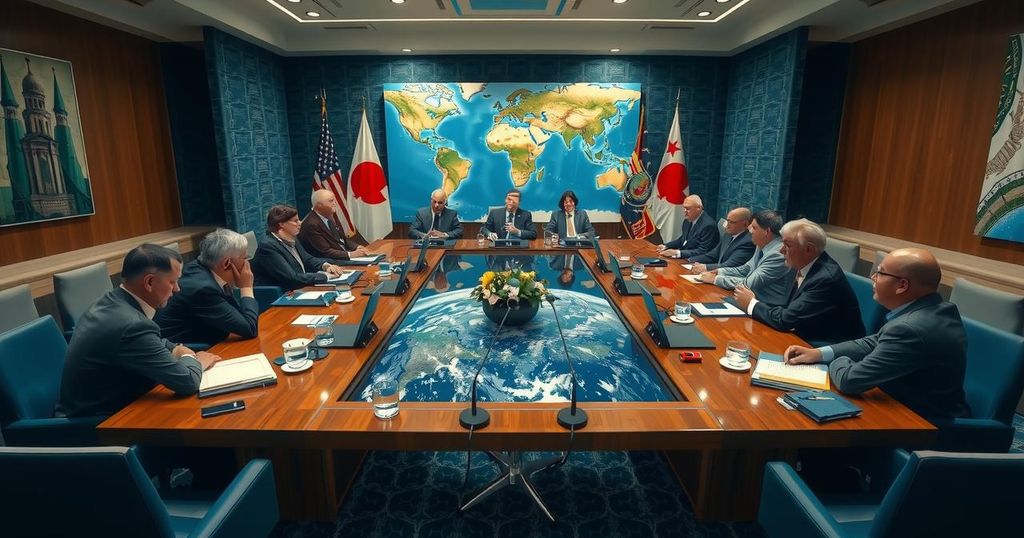The Climate Crisis: A Call for Immediate Action and Accountability in Global Efforts
Despite global efforts like COP conferences aimed at combating climate change, progress remains inadequate as emissions rise and biodiversity loss accelerates. Significant financial pledges from wealthier nations fall short of necessary commitments, while corporate actions often fail to align with stated climate goals. To address this crisis, immediate and substantial emissions reductions, alongside increased accountability for leaders, are imperative.
The ongoing climate crisis continues to escalate despite numerous global efforts and summits aimed at addressing the issue. Originally initiated at the Earth Summit in Rio de Janeiro in 1992, the annual COP conferences were created to unite governments in reducing temperatures and safeguarding biodiversity. Unfortunately, progress has stagnated, with current global temperatures surpassing the crucial threshold of 1.5°C, biodiversity loss deepening, and fossil fuel production reaching record highs. Leading actors, such as certain governmental figures and corporate entities, often prioritize profit over sustainable practices, leading to significant impediments in climate action.
While nations commit to initiatives, such as the recent pledge by wealthy countries to allocate $300 billion annually to assist developing nations, such commitments fall severely short of what is needed. For context, this figure represents only a quarter of what experts deem necessary to combat climate threats effectively. More glaring is the contrast between this monetary commitment and the $620 billion spent annually on fossil fuel subsidies. Shifting these funds towards renewable energy initiatives could dramatically alter the trajectory of climate efforts, yet such strategic redirection remains unaddressed.
Corporate responsibility also remains in question, as seen through companies like Amazon, which, despite setting ambitious targets to reduce emissions by 2040, witnessed a 40% increase in emissions over a four-year span. The broader narrative reveals a concerning trend in which both corporate and political leaders advocate for climate action while simultaneously failing to undertake substantial, timely measures.
Addressing the climate crisis entails difficult trade-offs that politicians often avoid discussing with their constituents. Achieving the necessary emissions reductions will necessitate an annual drop of 7.5% until 2035, necessitating a global investment of $6.5 trillion by 2030. This commitment is warranted, for failing to act now could exacerbate economic repercussions in the future. Renowned economists, such as Patrick Bolton and Kamiar Mohaddes, highlight the dire financial implications of inaction, warning that hesitation could lead to the loss of trillions of dollars in wealth.
Despite the pressing need for immediate action, many stakeholders continue to portray climate change as just one of several priorities, rather than an urgent crisis. The overreliance on fossil fuels, which currently account for over 80% of global energy, hampers bold climate initiatives. Efforts to pivot towards green technologies have been substantially undermined by a prevailing narrative that suggests reliance on speculative carbon removal technologies can mitigate the consequences of climate change—an approach fraught with risk.
Some experts propose that the concept of net zero is itself a hindrance, allowing for emissions that do not meet the necessary reductions in the present. This emphasizes the need for concrete, short-term measures that yield immediate impacts, such as curbing methane emissions, transitioning to alternative protein sources, and redirecting fossil fuel subsidies. Achieving substantial progress relies on grounded, actionable climate policies that reflect current capabilities and necessary adjustments.
The COP process has also encountered criticism, with calls for reforms that would ensure accountability and the exclusion of non-compliant nations from hosting duties. Moving forward requires candid recognition of shortcomings and a commitment to confront leaders who insist that continued fossil fuel usage aligns with global climate goals. Through collective commitment to emissions reductions and enhanced accountability measures, we can catalyze a more effective approach to the climate crisis. The transition towards sustainability is underway, but it necessitates accelerated efforts and unwavering dedication to overcome existing barriers.
The climate crisis represents one of the most daunting challenges faced by humanity, characterized by rising global temperatures, biodiversity loss, and escalating greenhouse gas emissions. Since the establishment of the COP conferences following the Earth Summit in 1992, nations have convened annually to coordinate efforts aimed at mitigating climate change. Despite these efforts, the overwhelming challenge posed by fossil fuel dependency and inadequate political and corporate action has persisted, hindering significant progress toward global climate targets.
In conclusion, the persistent failure to effectively address the climate crisis demonstrates a need for immediate and substantial action from both governments and businesses. The current trajectory of rising emissions, inadequate financial commitments to developing countries, and the prioritization of fossil fuel interests reflect a systemic issue that impedes genuine progress. Future climate efforts must refocus on immediate emissions reductions and hold leaders accountable for meaningful outcomes, rather than delayed pledges. Collective global commitment and decisive, real-world solutions are essential to avert further climate catastrophe and ensure a sustainable future.
Original Source: bylinetimes.com




Post Comment